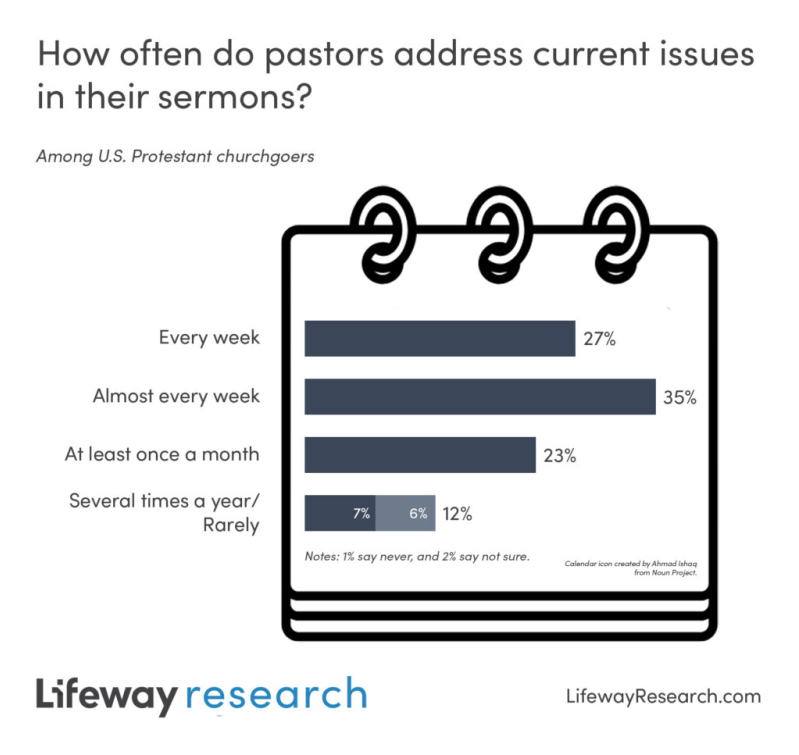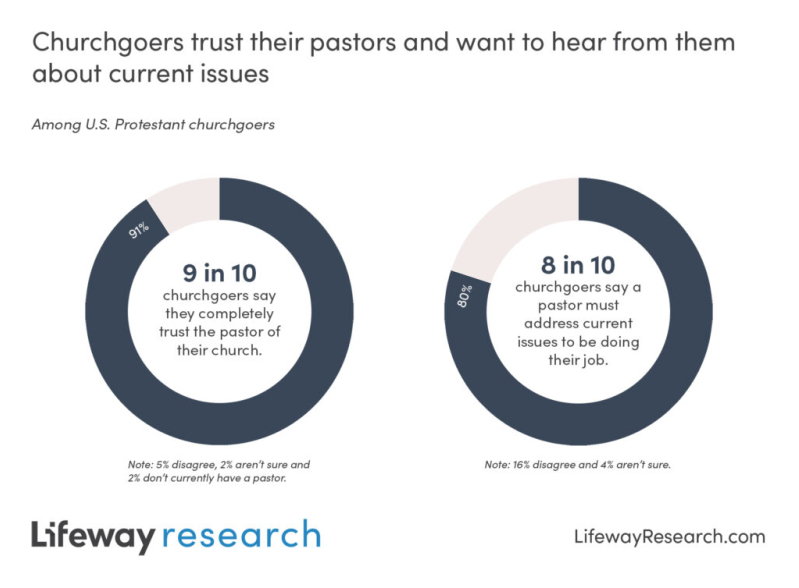
Churchgoers Want to Hear Pastors Address Current Issues
American churchgoers are looking for more than biblical explanation from their pastor each week. Many expect the sermons to help them understand and address modern cultural issues.
Four in 5 U.S. Protestant churchgoers (80%) believe a pastor must address current issues to be doing their job, according to a Lifeway Research study. Few (16%) disagree, and 4% aren’t sure.
“As American culture increasingly includes fewer overtly Christian elements and more non-Christian ideas, churchgoers are hungry to know what the Bible says about life’s issues,” said Scott McConnell, executive director of Lifeway Research.
Four in 5 U.S. Protestant churchgoers (80%) believe a pastor must address current issues to be doing their job.
Churchgoers seem to distinguish between addressing cultural issues and endorsing political candidates. A previously released Lifeway Research study of Americans found 29% believe it is appropriate for pastors to endorse candidates for public office during a church service. Christians who attend a worship service at least once a month are more likely than other Americans to believe endorsements during church services are acceptable, but still, only around a third (35%) agree.
Delivering on expectations
If Protestant churchgoers are looking for direct endorsements at church, they’re going to be disappointed. Just 2% of pastors say they have endorsed a political candidate during a church service this year, according to an additional Lifeway Research study of U.S. Protestant pastors.
But for churchgoers wanting pastors to address issues, most feel like their church meets those expectations. Around 3 in 5 say their pastor addresses current issues within a sermon around weekly, including 27% who say that happens every week and 35% almost every week. Another 23% say it happens at least once a month.
Only a handful of churchgoers say broaching modern topics happens less frequently. Around 1 in 14 (7%) say they hear a sermon addressing current issues several times a year, while 6% say that rarely happens. Just 1% say their pastor never addresses those topics in a sermon, and 2% aren’t sure.

“Churchgoers notice that most pastors are not just preaching from the Bible as an historical document,” said McConnell. “Pastors seek to explain the original meaning and context, but then apply those principles to issues and situations today. Such application of the biblical text helps churchgoers recognize its relevance.”
Churchgoers under the age of 50 are more likely to hear their pastors broach modern topics each week. Those aged 18-34 (34%) and 35-49 (41%) are more likely than those 50-64 (25%) and 65 and older (17%) to say their pastor’s sermons address current issues every week. African American churchgoers (40%) are also among the most likely to say they hear culturally relevant issues in sermons every week.
Those at the largest churches, with 500 or more in worship attendance, are among the most likely to say their pastors rarely address current issues (13%).
While 80% of churchgoers believe pastors must touch on these topics as part of their role, some are more likely to see this as necessary.
Methodists (96%) and those who attend Restorationist Movement churches (89%) are among the most likely to believe pastors must address current issues to be doing their job. White churchgoers (82%) and those of other ethnicities who are not African American or Hispanic (87%) are also among the most likely to see this as a requirement.
Older churchgoers, those 65 and older, are among the most likely to disagree that pastors must address current issues as part of their job (22%).
Pastoral trust
Congregants may want to hear from their pastors on the concerns of the day because they broadly trust those leading their churches.
More than 9 in 10 U.S. Protestant churchgoers (91%) say they completely trust the pastor of their church. Only 5% disagree, 2% aren’t sure and 2% say they currently do not have a pastor. Of those who have a pastor at their church, 92% of churchgoers trust them.

“It can be assumed from these numbers that most of those who have lacked trust in their pastor have either found a new church or no longer attend their church once a month or more,” said McConnell. “Yet, almost half of churchgoers with a pastor (47%) indicate their trust in their pastor could improve since they did not strongly agree that they completely trust the pastor of their church.”
Some churchgoers are more trusting of their pastor than others. Men are more likely than women to completely trust their pastor (93% v. 89%). Churchgoers with evangelical beliefs are also more likely than those without such beliefs to be trusting (95% v. 87%). White churchgoers (93%) and those aged 50-64 (95%) are among the most likely to completely trust the pastor of their church.
Additional education can raise distrust among churchgoers. Those with a graduate degree (9%) are more likely than those who have a high school diploma or less (4%) to say they don’t trust their pastor.
For more information, view the complete report.
Originally published at Lifeway Research.







